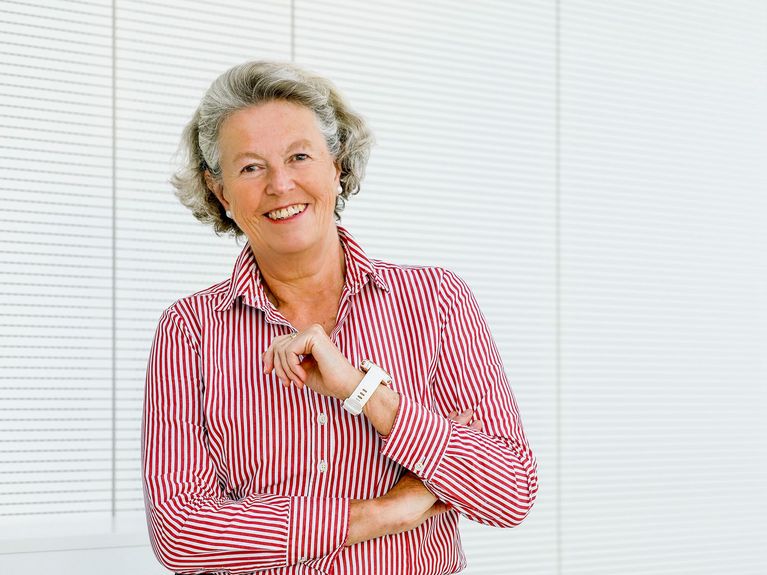Portrait
The allergist with a soft spot for barns

Director of the Institute of Asthma and Allergy Prevention and Head of the Department “Environmental Health” at Helmholtz Munich. Picture: Helmholtz Munich
Munich-based pediatrician Erika von Mutius is one of the leading experts on asthma and allergies – and has discovered that children who live on farms are better equipped to deal with them. Based on this finding, she now wants to develop a drug that could help asthma sufferers.
At first, Erika von Mutius could hardly believe her eyes: it was 1989, the Berlin Wall had just come down, and colleagues of hers in Leipzig and Halle were measuring the lung function and allergy status of children for a joint study. “There was extreme air pollution there at the time from heavy industry,” says the pediatrician and allergist, “and I was convinced that the children there surely must have far more problems with allergies than we did in Munich, which had comparatively clean air.” But the results showed just the opposite. After a brief moment of shock, von Mutius threw herself into her work to find out the causes: she had found her focus, which has stayed with her to this day.
As she talks with us in Garmisch-Partenkirchen, her gaze is fixed on the Alps. She retired from Ludwig-Maximilians-Universität a few months ago and is now focusing entirely on her research as head of the Institute for Asthma and Allergy Prevention at Helmholtz Munich. Her house, located in Werdenfelser Land, has been in the family for generations. Her grandfather worked there as a doctor – “and I realized that it was never ‘just’ a job for him. Being a doctor was part of his life,” she says. You’ll find von Mutius in her laboratory in Munich during the week and in Garmisch-Partenkirchen at the weekend. And it has long since become clear that she is just as committed to the medical ethos as her grandfather was.
However, things almost turned out very differently: as a teenager, inspired by the theater group at her high school, she actually wanted to study German and philosophy. “Then I made a deal with my mother: I would first apply to study medicine, but only in Munich. If it worked out, I would study medicine. If it didn’t, I could do whatever I wanted.” She did get a slot at the university, though she struggled terribly for the first few semesters: “I wanted to think things through and not just memorize facts and figures,” she says, looking back. “But then during my practical year at Hauner Children’s Hospital in Munich, it clicked.” Suddenly she had no problem finding her motivation; she got to know both the tragic side of working with seriously ill and dying children and the brighter side, helping little patients who were full of joie de vivre.
Allergology was still a young field at the time. “There was no data, no epidemiological studies in Germany,” she says. However, the need was there: doctors in private practice were sending droves of little patients to the pediatric clinic with asthma, neurodermatitis, food allergies – basically, with all the illnesses they didn’t know how to treat themselves. And von Mutius was there when allergology took off in Germany: she read up on the subject, trained herself, went to the USA to see how experienced specialists did the job, and finally, as a young investigator, led a multi-million-euro study in Munich on the effects of air pollutants in an urban-rural comparison. It was 1989, and after the fall of the Berlin Wall she brought colleagues in Leipzig and Halle on board to measure the air quality and disease rates there, too – with astonishing results.
Soon after, there were further studies that confirmed the surprising pattern: children who lived in homes heated with wood and coal had significantly fewer allergies. And: children who grew up on farms almost never suffered from hay fever.
At this point, von Mutius became a leading proponent of a theory that would go down in medical history as the “hygiene hypothesis” – or, in a modified form, the “farm hypothesis.” In a nutshell, it states that, if children grow up in a low-germ environment, their immune system never learns how to deal with pathogens and instead responds to substances that are actually harmless, like allergens. And the reverse is also true, as von Mutius and her team have since shown in a number of other studies: children who spend time in their own barn every day are far less likely to suffer from asthma and allergies as adults. “Early contact with all kinds of pathogens appears to have an anti-allergic effect,” says von Mutius.
And precisely this aspect is at the heart of her current challenge: she wants to develop a drug that helps against asthma and allergies and is pursuing an unusual approach to do so – using dust from barns, which she washes out and turns into an aqueous solution. When the solution is dripped into the noses of mice with allergies, “they actually get better,” says the researcher.
Translating this knowledge into a therapy for humans is the ambitious project she is now pursuing. A project that could close the circle: from the beginning of her career, when we knew almost nothing about the causes of allergies, to her retirement and a new beacon of hope for many patients, young and old alike.
Readers comments